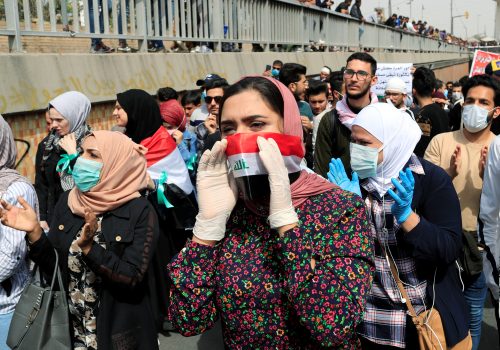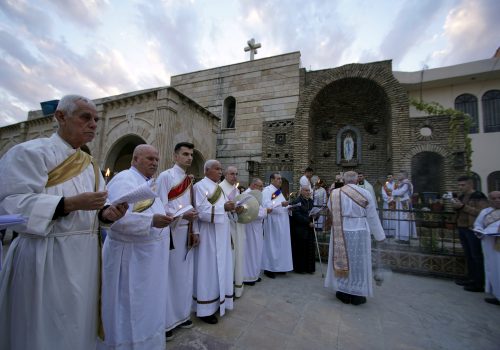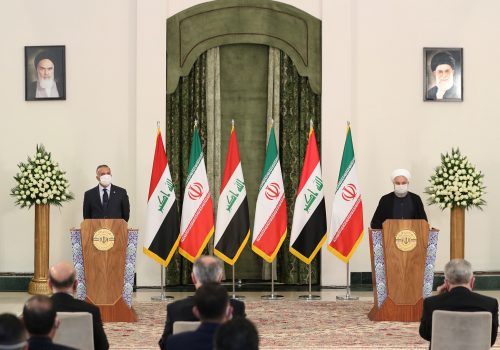Four takeaways from Iraqi Prime Minister Mustafa al-Kadhimi’s visit
If there was one principal outcome from President Trump’s meeting with Iraqi Prime Minister Mustafa al-Kadhimi on August 20, it was an alignment of expectations for the future US-Iraqi relationship. On the most important US concern, Kadhimi did not promise to eliminate Iranian influence in Iraq, and Trump did not press him on it. He did not need to.
The visit itself, and others like it, is much of how the United States competes with Iran in Iraq: through engagements, visits, and other symbolic gestures, which reinforce the current political trends of an Iraqi populace that simultaneously wants US engagement with Iran, does not want to confront militias militarily, and, above all else, does not want a US-Iran confrontation to materialize on its soil. And that is usually good enough for American national-security interests.
The Iraqi prime minister’s visit was important first and foremost as a message to Iraq’s public and political class. The visit should be viewed as neither an American concession to Kadhimi nor an American reward for policy steps he has taken, but rather a tool in the competition for political influence between the United States and Iran in Iraq. It is no coincidence that Iran also hosted Kadhimi for a similar high-profile visit a month ago, before he visited the United States and intended to visit Saudi Arabia—in Iraqi politics, a victory for Iran.
The meeting provided a message to the same Iraqi audience about Iran’s influence with Iraq’s new leader. Iran similarly used last November’s visit by the Iraqi populist cleric Muqtada al-Sadr to send a message to Iraqis protesting its influence over Iraq’s internal affairs. Sadr controlled one of the few militias with the capability to defend the protestors, and Iran wanted them to know he would not intervene to protect them, even though Tehran couldn’t be sure that this was the case. The symbolism is the message with these visits, not necessarily the immediate policy results.
The second consideration to keep in mind is that the Iranian government does not own the Iraqi prime minister, and neither does the United States. I worked with Kadhimi for years while at the US State Department and always admired his pragmatism, his support for Iraqi nationalism, and his genuine pro-US sentiments, while acknowledging that he, like every single Iraqi politician, was ultimately a realist. Any Iraqi leader who becomes prime minister will represent shades of strategic gray for the United States.
As a predominantly Shia country, and one that is economically tied to Iran, Iraq is unlikely to produce a leader who will share the same perception of regional security as that of US partners such as the United Arab Emirates or Saudi Arabia. However, if the United States plays its cards right, the Iraqis are unlikely to choose a leader from the Popular Mobilization Forces (PMF) and their political allies.
That’s enough to both limit Iraq’s threat to US partners and shape the Iraqi political environment in a manner that mitigates domestic fallout as we compete with Iran in Iraq and the region.Our policy comfort in choosing among shades of gray will impact how good we are at it. If US officials refuse a visit to the US until Kadhimi does X, Y, and Z, the chances are less likely he will do those things. It’s good we didn’t.
Third, Iraqis also see this visit as more of a means of affording Kadhimi personal capital and less as some gauzy message about an amorphous bilateral relationship. In Iraq, the United States must gear its policy toward individuals and not institutions, because that is how the Iraqi political game is played. The United States cannot solve the problems of the modern Arab state; when it has tried, most spectacularly in the Iraq War, it has failed. But the United States can focus on necessary short-term results, particularly those that benefit both Iraqis and Americans, rather than gearing its methods to what it thinks Iraq should look like in twenty years. Almost certainly, in the decades ahead, Iraqi politics will still very much be an individual game, with powerful political leaders looking for sponsors.
Virtually every senior politician in Iraq receives some sort of support from one or many regional powers. In a life-or-death political environment, that is necessary. The United States must play this way because it is how the game is played. The tools are visits, visas, investment, aid, and sanctions. The more these can be targeted at an individual level, to reward and punish individuals and compete within the gray zone of Iraqi politics, the better results the United States will have.
Fourth, there will always be redlines. The most pressing strategic problem for the United States are those elements of the Popular Mobilization Forces (PMF), militias raised and loosely incorporated under the government’s aegis, that answer to Iran. During his joint press availability with Trump, Kadhimi completely ducked questions about the militias, instead stressing US help in the fight against The Islamic State of Iraq and the Levant (ISIS) and the need for economic engagement. He delivered a similarly non-committal message to Iran last month.
Iraqi politicians want to adopt a see-no-evil policy toward the sharper edge of US-Iran competition in Iraq. Last summer, despite a series of explosions at PMF facilities, there was neither a binding Iraqi parliamentary vote to kick out US troops nor a political endorsement of reprisals, because civil war in Iraq is a political loser. Virtually no Iraqi wants the US-Iran competition to play out militarily in Iraq. The Iranians know it, their proxies know it, and Iraqi politicians know it. That’s a victory for the United States as it works to restrain the militias, the Iranians’ most potent tool.
At the joint press event with Kadhimi, Trump had it exactly right on militias: He said that when there are attacks, we deal with those attacks, but we do not burn down the house that the US and Iraq have built. Like his predecessors, Kadhimi cannot fix the seventeen-year problem of militias in Iraqi territory. The United States must be realistic about this problem, as the US has not been able to fix it either.
Indeed, in forty years of confronting Iran, the United States has never successfully solved the problem of Iranian support for militias acting as states within states. The US relationship with Kadhimi cannot depend on whether he succeeds where we have historically failed. Instead, Washington must compete in the gray zone, for partial victory, with all the tools at its disposal. This visit was a good start.
Andrew Peek was the Deputy Secretary of State for Iraq and Iran at the United States Department of State from 2017-2019.
Image: President Donald J. Trump, joined by Vice President Mike Pence and members of his Cabinet, participates in an expanded bilateral meeting with Prime Minister Mustafa Al-Kadhimi of the Republic Iraq Thursday, Aug. 20, 2020, in the Cabinet Room of the White House.


